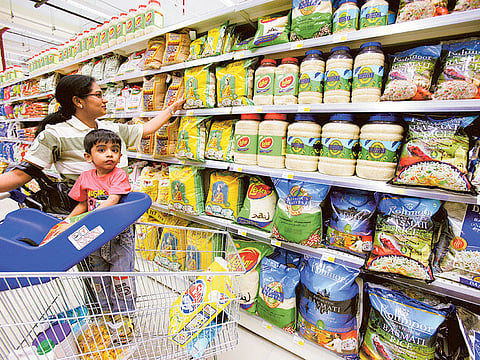UAE fixes prices of 500 staple grocery items for 2015
Cost of everyday such as rice, meat and flour to remain fixed through next year

Dubai: Prices of 500 products will be frozen in 2015 in the UAE, an official said.
Prices of everyday household consumables such as rice, oil, meats and flour will remain fixed through the next year, said Dr Hashim Al Nuaimi, director of the Consumer Protection Department at the Ministry of Economy.
The freeze will be on products sold under a list of brand names that will be made public soon.
He added that 500 outlets in the UAE, including branches of major supermarket chains such as Lulu and Union Co-operative Society, have agreed to the price freeze.
As the participating outlets comprise a majority market share, the price freeze will be meaningful and support the spending power of families, Al Nuaimi said.
Inspectors will check if the outlets are complying with the agreement and violators will face action, he added. Customers can also file complaints directly with the Consumer Protection Department.
Also, bulk buying of the items at locked rates in order to resell them individually at higher rates will not be tolerated.
Some smaller retailers were earlier found to be resorting to the practice to take advantage of the price freeze by their larger competitors. Consumer protection officials moved in to stop the reselling, warning there would be stiff fines for violators.
This is not the first time retailers and the ministry have reached an agreement to lock prices. The scheme started in 2011 and since then a total of 3,000 items, sold under various brand names, have been “locked in”, the director told Gulf News.
In 2015, more brands will join that list. The items include staples and “kitchen-use products used by the whole family every day”.
Participating outlets will have to clearly display and list what items are locked so customers can identify them. The price freeze is meant to maintain affordability and is unrelated to inflation, Al Nuaimi said.
Another aspect of the scheme is that the outlets will have to ensure stocks of the listed items are always available throughout 2015.
“We’re doing this after a lot of study and research, so families can continue to buy essential goods without worrying about the price or worrying if they’ll find them in store,” Al Nuaimi said.
“They should be always on the shelves, always on the same price for 2015.”
Besides the year-long price lock, the ministry also organises a similar campaign every Ramadan to control food prices. Left without official intervention, prices tend to rise sharply in Ramadan.
Hundreds of planned and surprise inspections were carried out to keep a lid on prices during Ramadan. In Ajman alone, more than 20 shops were found flouting rules in a sting operation in Ramadan this year.
Similar tactics will also be used to enforce the general year-long price freeze in 2015.


